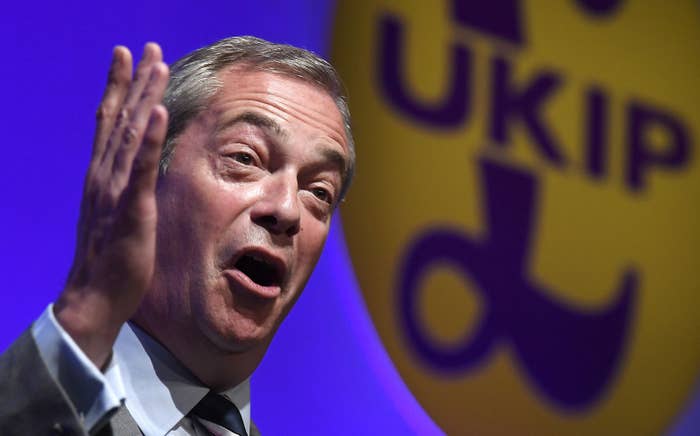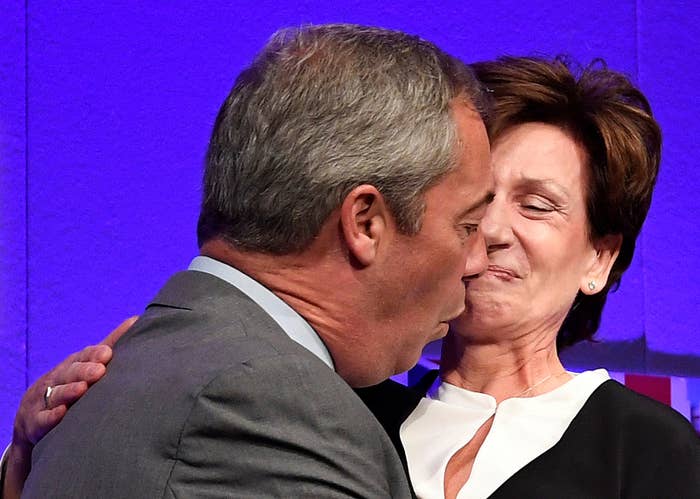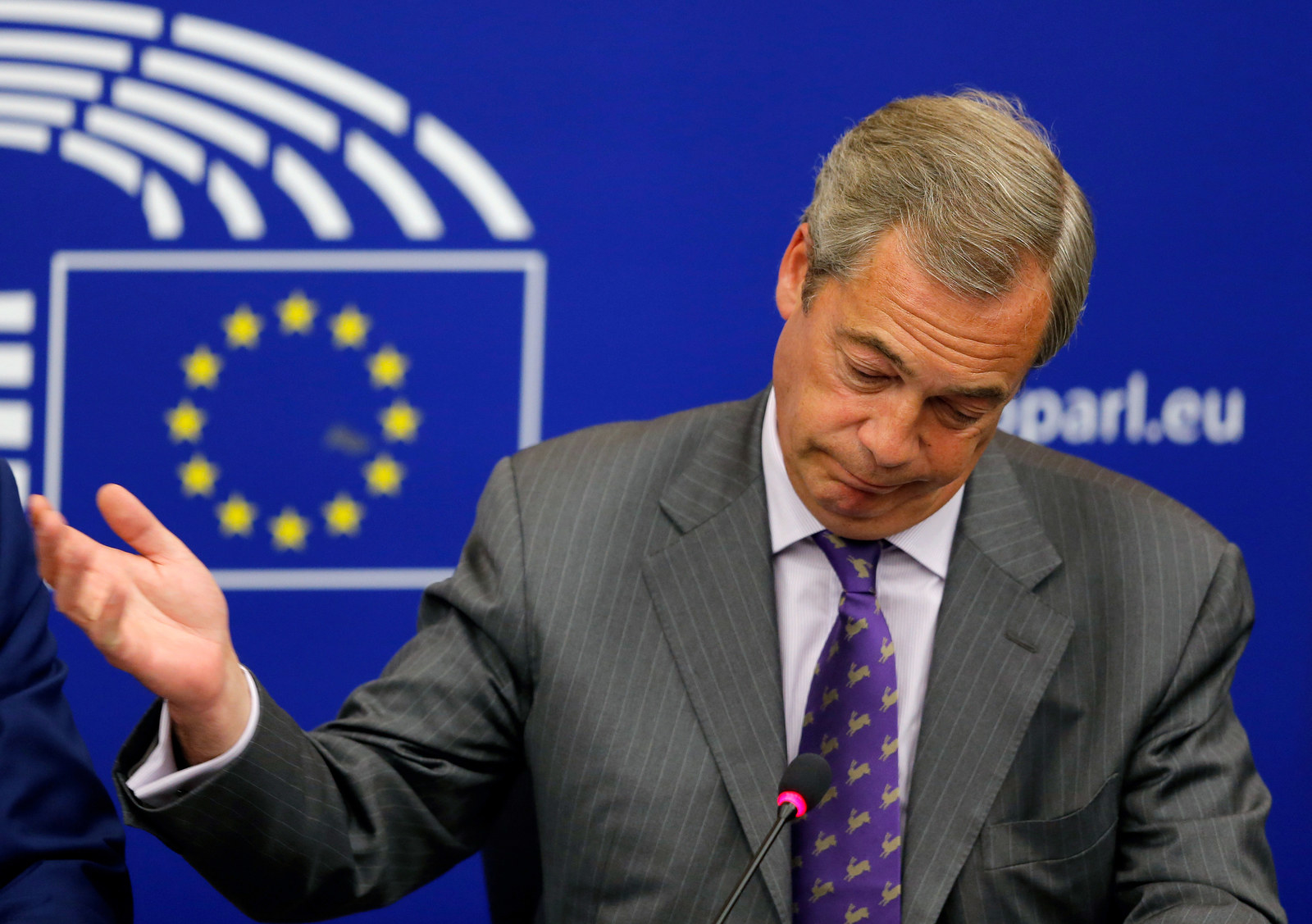
Theresa May is fond of saying Brexit means Brexit. But for UKIP, Brexit could also mean bankruptcy – or at least a struggle to get by.
Concerns have been raised about the state of UKIP's finances following the EU referendum, with major donors defecting to the Conservatives or threatening to form a new party now UKIP has achieved its main objective.
Now, to make matters worse, an analysis by BuzzFeed News shows just how much the party benefits from EU funding. Many support staff and a large proportion of the party's most prominent individuals are reliant on the EU for their income, which will vanish in 2019 if the government sticks to its planned timetable for Brexit.
Collectively UKIP's 22 MEPs can claim up to €6,072,000 (£5,400,000) a year from the European parliament to fund staff costs, with limited scrutiny of how it is spent.
Public records reveal that at least 76 different individuals are currently listed as employed by UKIP's MEPs using European funds, all working on behalf of the party's politicians.
There is no suggestion UKIP has broken the strict restrictions on using the funds for domestic political purposes, and some of these are simply constituency case workers. However, the majority of these employees have some personal connection to UKIP and many have social media profiles showing their campaigning on behalf of the party.
Among the staff employed by UKIP MEPs are prominent UKIP volunteers, councillors, regional organisers, and parliamentary candidates who may find it harder to dedicate as much time to the party if they were forced to find another job.
UKIP's 22 MEPs also benefit from EU-funded salaries worth €95,000 a year (£84,484) and expenses, giving them the freedom to campaign for UKIP.

"Many Eurosceptics, not only UKIP, are living off European funding," said Daniel Freund, head of advocacy at the campaign group EU international. "Other than the very direct money that the MEPs themselves receive, there is the staff allowance, and there is also the political groups which employ staff used for communications.
"What is prohibited is that any of the EU money is channelled into national party politics. But let's say it is a fine line that is difficult to really assess. If someone's salary is paid out of the European pot then sometimes they don't fulfil the bare minimum of work under their work contract. The EU has very little investigative power so they mainly rely on media reports and inquiries to point to these things."
To make matters worse, UKIP does not currently pay its leader from party funds, since Nigel Farage and his predecessors have traditionally survived on their EU-funded MEP's salaries and outside earnings – raising the question of how the party intends to pay its leaders in the future.
As a result, whoever wins the second UKIP leadership election of the year will have to battle to raise funds from donors to cover both campaign costs and, potentially, their own salary.
UKIP's media profile could also be hit by the loss of the EU jobs. Of the eight UKIP politicians who have appeared on BBC Question Time this year, six rely on European parliament funding for their main job by virtue of being MEPs or working for MEPs.
Meanwhile, the loss of EU funding will also see the party lose a number of policy and communications staff. Hermann Kelly, who is frequently referred to in the media as a "UKIP spokesperson", is technically employed by the European parliament's EFDD grouping.
The EFDD is nominally a pan-European political party, but in reality consists of UKIP, Italy's Five Star Movement, and a handful of fringe candidates from other nations. The arrangement was criticised after some EFDD funding was used to finance a Farage speaking tour and for security costs at major events in the run-up to the EU referendum.
Earlier this week UKIP was forced to deny reports in The Telegraph that it had a £800,000 “black hole” in its finances and owed substantial sums of money. However, the party's most recent accounts for 2015 reveal the party "had no financial reserves" and was "dependent upon contributions from donors" to meet ongoing costs, while the most recent Electoral Commission figures show the party owes £470,000 in loans.
The situation has reached the point where UKIP does not currently even have a base for its press office.

The situation is made worse by the party's struggle to establish itself in domestic politics. The only prominent UKIP politicians certain to continue to receive full-time salaries from politics after 2019 are the party's only MP, Douglas Carswell; its two London assembly representatives; and seven members of the Welsh assembly, including Neil Hamilton.
Tim Aker, a UKIP MEP for the East of England, helps to fund at least four employees in the UK who also happen to be UKIP councillors. One of them, his spokesperson Jack Duffin, said that if May delivers Brexit by 2019, "I will no longer work for an MEP after happily voting for the sack."
Some central office staff are now working part-time for these groups in order to keep costs down.
“We will have to cut out suit to suit our cloth. That is only right and proper," admitted a UKIP spokesperson. "You’ve got to remember that while the MEP and EFDD funding has been useful in certain ways, it’s actually very, very restrictive. It is enormously useful if you want to produce trade pamphlets, not so useful if you want to go out campaigning.”
However, the spokesperson – who said they themselves had lost their own house as a result of quitting their EU job and taking a pay cut to work directly for the party during the referendum campaign – admitted UKIP faced serious financial challenges as a result of losing European funding.
"We are the turkeys that voted for Christmas," they said. "How many jobs are going to be lost because of Brexit? Well, ours, for one. We were cutting our own throats."
The spokesperson also suggested a future UKIP leader could try to boost donations from wealthy donors by promising to keep up the pressure on May to deliver Brexit, but admitted there were doubts about how the next UKIP leader would be paid post-Brexit.
"That is a problem for the new party leader," they said.
